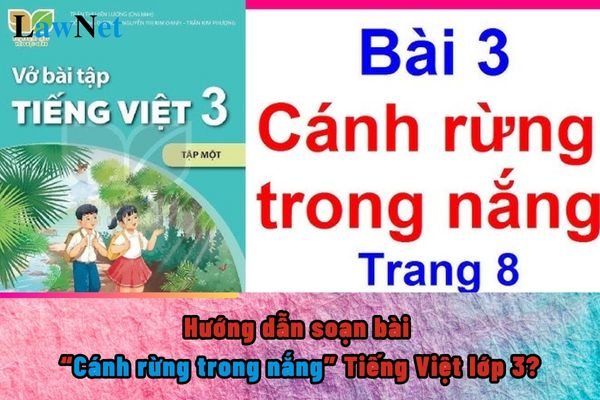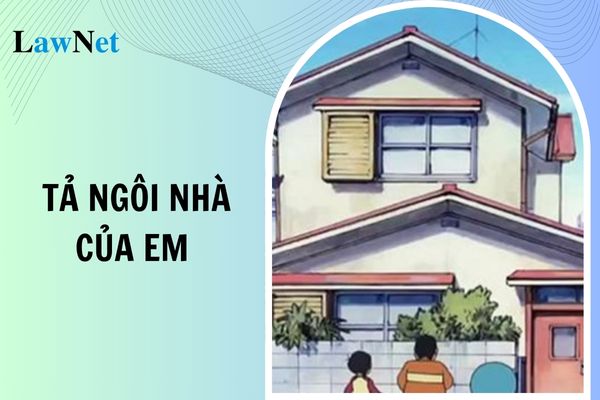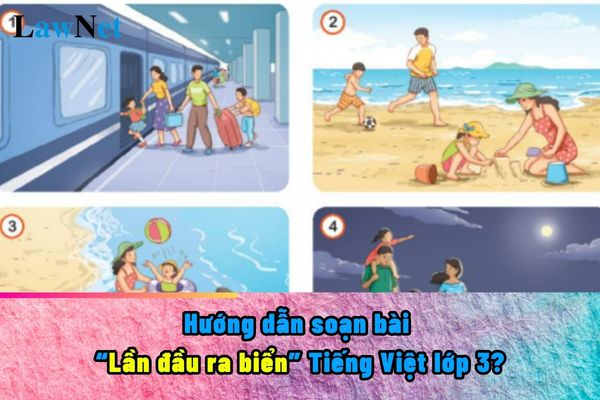Guidelines on preparing the lesson Cánh rừng trong nắng for grade 3 students in Vietnam
Guidelines on preparing the lesson Cánh rừng trong nắng for grade 3 students in Vietnam
The lesson "Cánh rừng trong nắng" is part of the reading comprehension section in the grade 3 Vietnamese Language curriculum, found on pages 17 and 18 of the Week 2, lesson number 3 of the "Kết nối tri thức" curriculum.
Teachers, parents, and students can refer to the following Guidelines on preparing the lesson Cánh rừng trong nắng for grade 3 students in Vietnams:
|
Guidelines on preparing the lesson Cánh rừng trong nắng for grade 3 students in Vietnam * Main Content and Meaning of the Lesson |
*Note: Information is for reference only./.
Guidelines on preparing the lesson Cánh rừng trong nắng for grade 3 students in Vietnam (Image from the Internet)
What qualities and competencies are required for grade 3 students in Vietnamese Language?
Based on Section V of the General Education Program for Literature, issued with Circular 32/2018/TT-BGDDT:
*Requirements for Core Qualities and General Competencies
The Literature subject contributes to the formation and development of students' core qualities and general competencies at levels appropriate to the subject and educational level as specified in the overall program.
Furthermore, based on Section IV of the General Education Program for Literature, issued with Circular 32/2018/TT-BGDDT, the specific competencies required for completing the grade 3 Vietnamese Language program include:
[1] Required Language Competencies:
- Read correctly, fluently, and expressively; understand the main content of the text, primarily explicit content; begin to understand implicit content such as themes and lessons learned from the text.
- At the primary level, reading requirements include both reading techniques and reading comprehension skills. For students in the early grades (grade 1 and grade 2), focus on both reading accurately at a suitable pace and understanding simple content of the text.
For students in grades 3, 4, and 5, focus more on understanding specific content, themes, and lessons drawn from the text.
- From grade 1 to grade 3, write correctly regarding spelling, vocabulary, and grammar; write some sentences and short paragraphs; in grades 4 and 5, begin to write short, complete essays, mainly narrative, descriptive, and simple introduction essays.
- Write texts narrating read stories, witnessed events, participated events, imagined stories; describe familiar objects or phenomena; introduce objects and activities close to the students' lives.
- Write paragraphs expressing students' feelings and thoughts when reading a story or poem, witnessing an event evoking many emotions; expressing opinions on a simple topic in studies and life; write some types of texts such as: autobiographies, messages, invitations, schedules, applications, ...; begin to know how to write according to the process; the writing should have three parts (introduction, body, conclusion).
- Present ideas and emotions clearly; begin to use suitable gestures and expressions when speaking; narrate a read or heard story clearly; share, exchange feelings, attitudes, and thoughts about discussed topics; explain an object or simple process.
- Understand basic content with an appropriate attitude; recognize the speaker's emotions; know how to respond to what is heard.
[2] Required Literary Competencies:
- Distinguish between prose and poetry (paragraphs, prose pieces vs. verses, poems); recognize the content of the text and the writer's attitude and feelings; begin to understand the effects of some formal elements of literary texts (words, characters, plot, rhyme, comparison, personification). Know how to relate, imagine, and express literarily in writing and speaking.
- For students in grades 1 and 2: recognize who or what the text is about; identify characters in stories and rhyme in poems; recognize stories and poems.
- For students in grades 3, 4, and 5: know how to read expressively; retell and summarize the main content of stories and poems; comment on characters, events, and the writer's attitudes and feelings in texts; recognize time and place, some types of rhyme, rhythm, beautiful and unique words and images, and the effects of rhetorical devices like personification and comparison.
- Understand the meaning or lesson drawn from texts. Write paragraphs or essays narrating stories and describing depicting emotions and imaginative connections.
Thus, according to the regulations, the requirements for the grade 3 Vietnamese Language subject must ensure both general and core competencies.
What are regulations on assessment of results of Vietnamese Language of in grade 3 students?
Based on Section VII of the General Education Program for Literature, issued with Circular 32/2018/TT-BGDDT, the assessment requirements for the grade 3 Vietnamese Language subject, or for any books in the "Chân trời sáng tạo" curriculum, must align with the specific framework of the General Education Program for Literature as follows:
- Assessments in Literature are conducted in two ways: continuous assessment and periodic assessment.
- Continuous assessment is carried out throughout the teaching process, organized by subject teachers; assessment forms include: teacher assessment of students, students assessing each other, and students' self-assessment.
For continuous assessment, teachers can rely on daily observations and records of students, students' answering questions or presenting exercises, writing literary analysis and feedback, writing summaries, doing projects, gathering materials, completing research assignments, etc.
- Periodic assessment is conducted near the end or at the end of a study period (end of term, end of educational level) organized by educational institutions to manage teaching activities, ensure educational quality, and support curriculum and learning material development. Periodic assessment is usually through written test or exam questions.
Test or exam questions may include essay questions (one or more questions); may combine objective multiple-choice questions and open-ended essay questions to assess reading comprehension and require writing essays on topics within the learned types of texts. If necessary and conditions permit, oral tests (to assess speaking and listening) can be used.
- In assessing learning outcomes at the end of the school year or educational level, it is necessary to innovate assessment methods (structure of questions, ways of asking questions, difficulty levels, etc.); use and exploit materials that meet the evaluation criteria, address the issue of students merely memorizing or copying resources; avoid reusing pre-read texts to accurately assess reading comprehension and analysis, and literary appreciation.
- Regardless of the assessment method, students should be allowed to express their language competencies, literary competencies, figurative thinking and logical thinking, and their own thoughts and feelings, not borrow or copy; encourage unique and creative essays.
Students should be guided to understand to master objectives, methods, and evaluation criteria for these competencies and qualities.
Download the General Education Program for Literature issued with Circular 32/2018/TT-BGDDT.
>>> See more: How to write a paragraph expressing emotions after reading a four-line or five-line poem for 7th grade Literature?
>>> See more: Guidelines for Preparing the Lesson on Synonyms for 5th Grade Vietnamese Language?
>>> See more: How to Write a Descriptive Essay on Scenery for 5th Grade Vietnamese Language?
>>> See more: Outline for a Descriptive Essay on Scenery for 5th Grade?
>>> See more: Top 10 Short and Best Descriptive Essays on Scenery for 5th Grade?
>>> See more: Guidelines for Preparing the Lesson "Trước cổng trời" for 5th Grade Vietnamese Language?
>>> See more: Guidelines for Preparing the Lesson "Đồng dao mùa xuân" Short for 7th Grade Literature?
>>> See more: Required Competencies for 5th Grade Vietnamese Language?
>>> See more: Required Reading Speed for grade 3rs according to New Curriculum?
>>> See more: Required Competencies for 4th Grade Vietnamese Language in the 2018 Curriculum?










- Vietnam: What is the sample report on a modern literary matter - innovations and renovations in the short stories "Chiếc thuyền ngoài xa" and "Một người Hà Nội"?
- Vietnam: What are the 05 sample 600-word argumentative essays on negative issues among youth today? How many types of texts are there in the content of the 12th-grade Literature curriculum?
- Vietnam: What are the best sample paragraphs about your family for 6th-grade students? What elective subjects do 6th-grade students learn?
- Vietnam: What are the best sample self-introductions in English for 5th-grade students? What topics are covered by the 5th-grade English curriculum?
- Vietnam: What are the sample imaginary paragraphs on Tin-tin and Mi-tin entering the magical garden for 4th-grade students? What are the 05 essential qualities required for 4th-grade students?
- Vietnam: What are the guidelines for preparing the briefest lesson "A Strange Tale of the Fisherman's House/Truyện lạ nhà thuyền chài"? What is the eligibility for lower secondary graduation recognition for 9th-grade students?
- What are the enrollment methods of Pham Ngoc Thach University of Medicine in 2025?
- Vietnam: What are the sample 1st end-of-semester question papers of 9th-grade Literature? What is the form of assessment for 9th-grade Literature?
- Vietnam: What are the 10 sample 200-word social argumentative paragraphs on the strength of discipline? Is improving manpower one of the goals of education?
- What are the sample social argumentative essays on a social issue raised from a literary work in the 8th-grade Literature curriculum in Vietnam?

